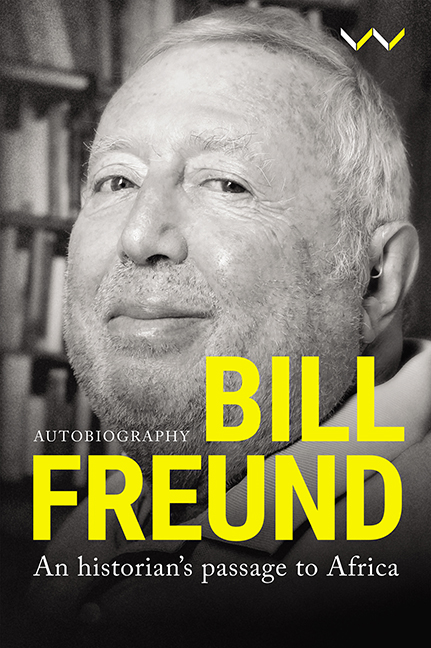Book contents
- Frontmatter
- Contents
- Foreword: Bill Freund and the Making of His Autobiography
- Family Tree
- A Brief Introduction
- 1 The Austrian Past
- 2 The Aftermath of War: A Perilous Modernity
- 3 The Dark Years
- 4 A New Life in America
- 5 Adolescence: First Bridge to a Wider World
- 6 As a Student: Chicago and Yale
- 7 As a Student: Africa and England
- 8 The Tough Years Begin
- 9 An Intellectual and an African: Nigeria
- 10 An Intellectual and an African: Dar es Salaam and Harvard
- 11 South Africa, My Home
- Notes
- Select Bibliography of Bill Freund’s Publications
- List of Illustrations
- Author’s Acknowledgements
- Supplementary Acknowledgements
- Index
A Brief Introduction
Published online by Cambridge University Press: 15 June 2021
- Frontmatter
- Contents
- Foreword: Bill Freund and the Making of His Autobiography
- Family Tree
- A Brief Introduction
- 1 The Austrian Past
- 2 The Aftermath of War: A Perilous Modernity
- 3 The Dark Years
- 4 A New Life in America
- 5 Adolescence: First Bridge to a Wider World
- 6 As a Student: Chicago and Yale
- 7 As a Student: Africa and England
- 8 The Tough Years Begin
- 9 An Intellectual and an African: Nigeria
- 10 An Intellectual and an African: Dar es Salaam and Harvard
- 11 South Africa, My Home
- Notes
- Select Bibliography of Bill Freund’s Publications
- List of Illustrations
- Author’s Acknowledgements
- Supplementary Acknowledgements
- Index
Summary
If they were born in the US to non-native parents, they are ‘secondgeneration immigrants’. They have lived an authentically American experience, yet they carry the memes of foreign culture learned on their mother's knees, at their grandparents’ table on feast days, from the strange old books and discrimination brought from the old country. They know the words of old songs. It may even be that second-generation immigrants feeling discriminated against, misunderstood and rejected by America, seek to immerse themselves in the culture and ideals of their parents’ homeland, fabricating a hybrid identity for themselves based on an acquired reality they have never actually lived through, debased, idealised and simplified from the original.
– James Meek, London Review of Books, 5 January 2017For an American child of my time, I had a very unusual background. The particular combination of my parents and the situation in which I found myself was not only essential to what formed me but has driven me throughout my life. I was the son of refugee parents of considerable intelligence and life experience who came together, having found themselves lonely and stuck in a great provincial American city with little money and little sense of how to be a success in their new society, whose values were often very alien to them. They clung for a long time to the typical values of the society in which they had grown up.
It was probably fairly common for a child of central European refugees to want to access that route to success and aspire to a more prestigious and affluent life in America – and here I am not unusual at all. For an obvious example, the best-known William Freund you will find on the Internet was the chief economist of the New York Stock Exchange. He came from a German Jewish refugee family who built up a little business in New York after arrival from Nuremberg. He grew up in the same neighbourhood as Henry Kissinger, also from the Nuremberg area, and there are many like him. I was, however, a child with the kind of talent that led me to love books, politics, history, the past, words and languages, but with no aptitude for or connection with the business world.
- Type
- Chapter
- Information
- Bill FreundAn Historian's Passage to Africa, pp. 1 - 4Publisher: Wits University PressPrint publication year: 2021



